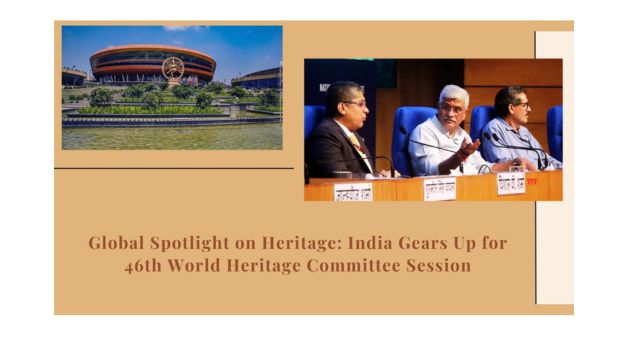India gears up to host the 46th World Heritage Committee Session of UNESCO for the first time
New Delhi is set to take center stage on the global cultural platform as it gears up to host the 46th World Heritage Committee Session of UNESCO from July 21 to 31, 2024. This marks a significant milestone for India, as it will be the first time the country will be playing host to this prestigious event.
A Global Gathering to Celebrate Heritage
The World Heritage Committee Session brings together delegates from over 150 countries to deliberate and collaborate on preserving our shared cultural and natural heritage. This year’s session will be inaugurated by Prime Minister Narendra Modi on July 21st at the Bharat Mandapam in New Delhi. The ceremony will be graced by the presence of Audrey Azoulay, Director-General of UNESCO, along with Culture Ministers, Ambassadors, and domain experts from across the globe.
India’s Rich Heritage Takes Center Stage
The week-long session will focus on various aspects of heritage conservation. A key agenda item will be the examination of proposals from various countries for the inclusion of 27 sites on the coveted World Heritage List. India itself has a strong contender in the race – the Moidams, a unique mound-burial system of the Ahom dynasty located in Assam. This will be the first-ever nomination from the northeastern part of the country.
The session will also delve into the state of conservation of existing World Heritage Sites. Out of the 124 World Heritage Sites to be reviewed, 57 are classified as World Heritage in Danger, highlighting the urgent need for international cooperation and support to ensure their preservation.
Showcasing India’s Cultural Glory
Beyond the formal proceedings, the session promises a vibrant celebration of India’s cultural heritage. The venue, Bharat Mandapam, will be transformed into a treasure trove of exhibitions and immersive experiences. Visitors can embark on virtual journeys through three renowned South Indian temples – the Rani ki Vav (the Queen’s Stepwell) in Patan, Gujarat, the Kailasa Temple in Ellora Caves, Maharashtra, and the Hoysala Temple in Halebid, Karnataka.
Additionally, an “Incredible India” exhibition will showcase the country’s diverse tapestry of cultures, ancient civilizations, and geographical marvels. This will be complemented by stalls representing various ministries, including Information Technology, Tourism, and Handicrafts, alongside state-specific displays highlighting regional heritage.
A Mega Event with Lasting Impact
The 46th World Heritage Committee Session is not just a week-long event; it’s an opportunity for India to strengthen its position as a cultural superpower on the world stage. As highlighted by Gajendra Singh Shekhawat, the Union Culture and Tourism Minister, this session is a “first mega event” under the third term of the Modi government. He anticipates that the event will not only showcase India’s cultural and natural heritage but also project the nation’s soft power and foster global collaborations in heritage conservation efforts.
This mega event is a culmination of meticulous planning and years of dedicated work. In 2021, India secured a coveted spot on the prestigious 21-member World Heritage Committee, embarking on a four-year term. The country has already made significant strides in heritage preservation, with 42 properties inscribed on the World Heritage List, including 34 cultural, seven natural, and one mixed heritage site. In the last decade alone, 12 new sites have been added, including the iconic Santiniketan in West Bengal and the Sacred Ensembles of the Hoysalas in Karnataka. With 57 more sites on the Tentative List, India’s commitment to heritage conservation is undeniable.
The 46th World Heritage Committee Session promises to be a landmark event, fostering international cooperation, celebrating cultural diversity, and propelling India’s rich heritage onto the global stage.
FAQs:
Question: When and where will the 46th World Heritage Committee Session be held?
Answer: The 46th World Heritage Committee Session will be held in New Delhi, India, from July 21 to 31, 2024.
Question: Why is this session significant for India?
Answer: This session is significant for India because it is the first time the country will be hosting the World Heritage Committee Session.
Question: What is the main focus of the World Heritage Committee Session?
Answer: The World Heritage Committee Session focuses on deliberating and collaborating on preserving cultural and natural heritage sites around the world.
Question: What are some of the agenda items for the session?
Answer: The session will examine proposals for new World Heritage Sites, discuss the state of conservation of existing sites, and explore opportunities for international cooperation in heritage preservation.
Question: What is India’s nomination for the World Heritage List?
Answer: India’s nomination for the World Heritage List is the Moidams, a unique mound-burial system of the Ahom dynasty located in Assam.
Question: How many World Heritage Sites does India currently have?
Answer: India currently has 42 World Heritage Sites inscribed on the World Heritage List.
Question: What are the different categories of World Heritage Sites?
Answer: World Heritage Sites are classified into three categories: cultural, natural, and mixed.
Question: What is the role of UNESCO in World Heritage preservation?
Answer: UNESCO plays a vital role in World Heritage preservation by establishing the World Heritage Convention, providing technical assistance, and raising awareness about the importance of heritage conservation.
Question: What are some of the challenges faced in World Heritage preservation?
Answer: Some of the challenges faced in World Heritage preservation include climate change, natural disasters, human activities, and lack of funding.
Question: How can individuals contribute to World Heritage preservation?
Answer: Individuals can contribute to World Heritage preservation by being responsible tourists, supporting conservation organizations, and raising awareness about the importance of protecting these irreplaceable cultural and natural treasures.
OTHER LINKS:
👉 Andhra Pradesh’s groundbreaking natural farming program has received international acclaim after winning the prestigious Gulbenkian Prize 2024 for Sustainability — read the full story on how this Indian initiative is transforming agriculture and earning global recognition for natural farming.

